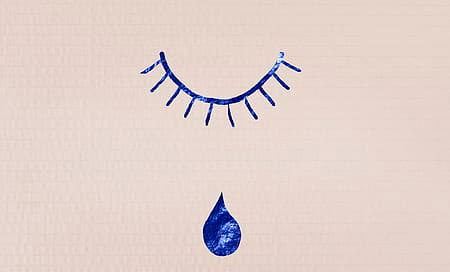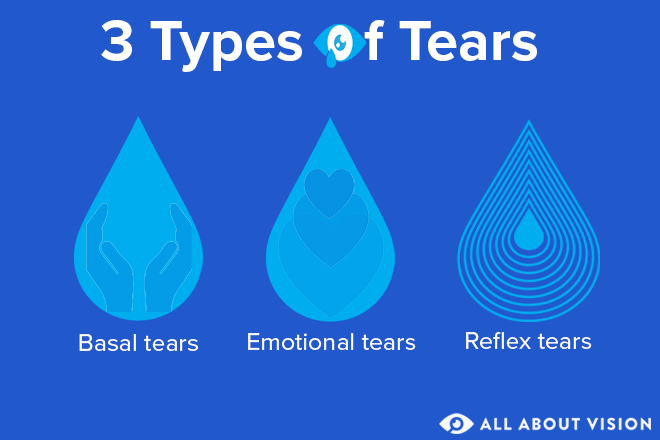Did you know that humans are the only creatures that shed emotional tears?
Are you aware that there are 3 different kinds of tears?
Do you cry easily, or are you skilled at suppressing your tears?
What is the purpose of crying, anyway?
Our miraculous bodies have a system for everything. Making and shedding tears serves us by keeping our eyes healthy, and helping to off-load intense emotions.
Tears 101
Basal Tears, aka Basic Tears, are produced constantly to keep our eyes lubricated and to protect and nourish the cornea. This keeps our eyes comfortable and our vision clear.
Reflex Tears spring to action when our eyes need to wash away harmful irritants, such as smoke, dust, or fumes, and these tears contain more antibodies to help fight bacteria.
Emotional Tears help flush away stress hormones and also release feel-good hormones which help regulate our emotions and also serve as social signals. Our emotional tears are triggered by a variety of feelings, both negative and positive.
TL;DR Why do we cry? The three types of tears - Alex Gendler
Harsh Myths about Crying
Big boys don’t cry. Girls are cry babies.
Shaming children for showing emotion is particularly cruel since part of their growth process is developing self-regulation, which they learn from the adults around them (oh, snap!). Adults who project their own discomfort and unresolved negative feelings onto others lack self-awareness and cause harm.
Men who cry are weak. Women cry to manipulate.
Men and women both experience pain and suffering equally, of course. Applying different standards and expectations of expression based on gender varies from culture to culture and is generally part of the long-standing patriarchal system which harms all genders.
Avoid crying in public at all costs.
Suppressing our emotions until it is convenient for others is deleterious. Emotions will express, if not appropriately then harmfully - road rage, terrorizing loved ones, or other erratic and untrustworthy behaviors (see repressive coping, below).
Crying Emotional Tears is Good For Us
The urge to cry might be uncomfortable for some of us, unless our tears are a result of belly-laughs, but the good news is that crying in response to intense emotion has health benefits! Let’s look at a few:
Emotional tears communicate our feelings to others, helping to connect people through strong emotions. Crying makes us feel more vulnerable, and has been shown to increase attachment behavior, encouraging closeness, empathy, and support from friends and family.
Emotional crying tends to make us feel better and may be part of the healing process. Emotional tears contain more stress hormones and natural painkillers than other types of tears. Crying is cathartic, helping us to move through pain rather than avoiding or suppressing - what psychologists call repressive coping. Studies have linked repressive coping with a less resilient immune system, cardiovascular disease, and hypertension, as well as with mental health conditions including stress, anxiety, and depression.
People who cry freely are able to face their pain more readily and honestly, indicating higher emotional intelligence. Self-awareness and empathy come more naturally and lead to flexible thinking and other signs of resiliency.
When is Crying Too Much?
Excessive or uncontrolled crying can indicate a state of being that needs professional assistance. Trauma, chronic pain, hormonal imbalances, chronic disease, suicidal ideation, unrelenting stress, abusive relationships, anxiety and depression rarely resolve on their own. Learn to recognize the signs and know that help is available. Everyone deserves to feel as well as they can.
National Suicide Prevention Lifeline on 800-273-8255 (if in the U.S.)
Let Them Flow
Our bodies are exquisitely designed, and crying is a natural human response to strong emotions. It’s a healthy way to express ourselves, and we benefit from releasing pent-up emotions and boost our general health in the process.
"There is a sacredness in tears. They are not the mark of weakness, but of power. They speak more eloquently than ten thousand tongues. They are the messengers of overwhelming grief, of deep contrition, and of unspeakable love."
Washington Irving
Listen to Elly Ameling, Gerard Souzay sing a duet by Fauré: Pleurs d'or, Op. 72
Listen to Fritz Wunderlich: 2. Dichterliebe - 'Aus meiner Thränen spriessen' - Schumann
Listen: " Piangero La Sorte Mia " (George Frideric Handel) - por Kiri Te Kanawa.
Listen: The Tracks of My Tears - Smokey Robinson & The Miracles
May you live in ease and kindness, with a free heart.
Singing Lessons: www.WAVS.info
Well Coaching: BarbaraShirvisWellness.com







